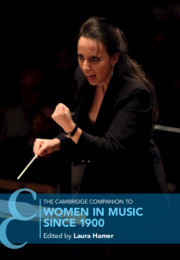Book contents
- The Cambridge Companion to Women in Music since 1900
- Cambridge Companions to Music
- The Cambridge Companion to Women in Music since 1900
- Copyright page
- Dedication
- Contents
- Figures
- Boxes
- Notes on Contributors
- Preface
- Abbreviations
- Part I The Classical Tradition
- 1 Women in Composition before the Second World War
- 2 Women in Composition during the Cold War in Music
- 3 Behind the Iron Curtain: Female Composers in the Soviet Bloc
- 4 Still Exceptional? Women in Composition Approaching the Twenty-First Century
- 5 On the Podium: Women Conductors
- 6 Soloists and Divas: Evolving Opportunities, Identity, and Reception
- In Her Own Words: Practitioner Contribution 1
- Part II Women in Popular Music
- Part III Women and Music Technology
- Part IV Women’s Wider Work in Music
- Appendix: Survey Questions for Chapter 14, The Star-Eaters: A 2019 Survey of Female and Gender-Non-Conforming Individuals Using Electronics for Music
- Select Bibliography
- Index
- References
2 - Women in Composition during the Cold War in Music
from Part I - The Classical Tradition
Published online by Cambridge University Press: 17 April 2021
- The Cambridge Companion to Women in Music since 1900
- Cambridge Companions to Music
- The Cambridge Companion to Women in Music since 1900
- Copyright page
- Dedication
- Contents
- Figures
- Boxes
- Notes on Contributors
- Preface
- Abbreviations
- Part I The Classical Tradition
- 1 Women in Composition before the Second World War
- 2 Women in Composition during the Cold War in Music
- 3 Behind the Iron Curtain: Female Composers in the Soviet Bloc
- 4 Still Exceptional? Women in Composition Approaching the Twenty-First Century
- 5 On the Podium: Women Conductors
- 6 Soloists and Divas: Evolving Opportunities, Identity, and Reception
- In Her Own Words: Practitioner Contribution 1
- Part II Women in Popular Music
- Part III Women and Music Technology
- Part IV Women’s Wider Work in Music
- Appendix: Survey Questions for Chapter 14, The Star-Eaters: A 2019 Survey of Female and Gender-Non-Conforming Individuals Using Electronics for Music
- Select Bibliography
- Index
- References
Summary
Chapter 2, ‘Women in Composition during the Cold War in Music’, focuses on women active in the West, where, for all the apparent government liberalism, in musical terms, composers had to face what could often, at the time, seem like the monolithic regime of total serialism, as advocated by Pierre Boulez and his circle. Through a range of case studies, including Grace Williams, ElizabethMaconchy (whose pre-war careers are both also discussed in Chapter 1), Elisabeth Lutyens, Thea Musgrave, Betsy Jolas, Louise Talma, Julia Perry, and Miriam Gideon, Rhiannon Mathias deftly considers the compositional strategies which women developed to respond to this musical environment.
Keywords
- Type
- Chapter
- Information
- The Cambridge Companion to Women in Music since 1900 , pp. 18 - 32Publisher: Cambridge University PressPrint publication year: 2021



